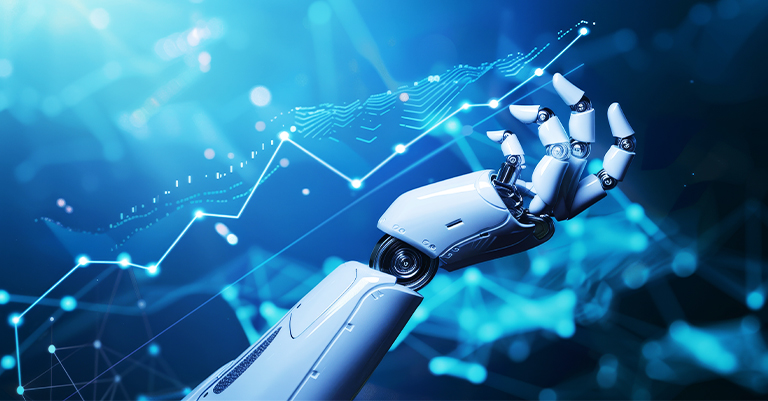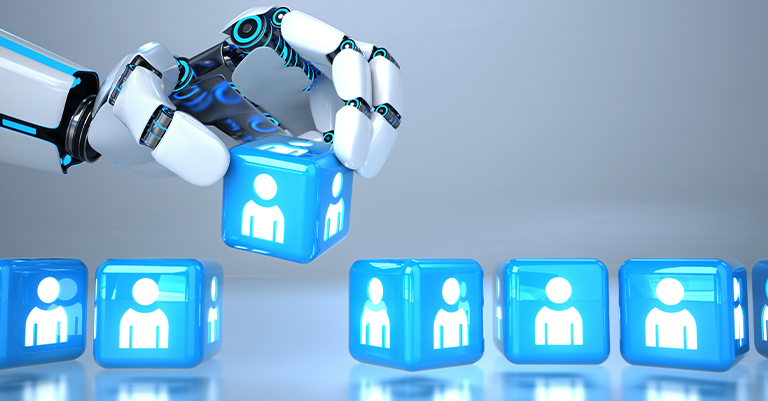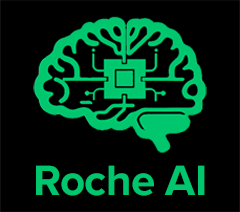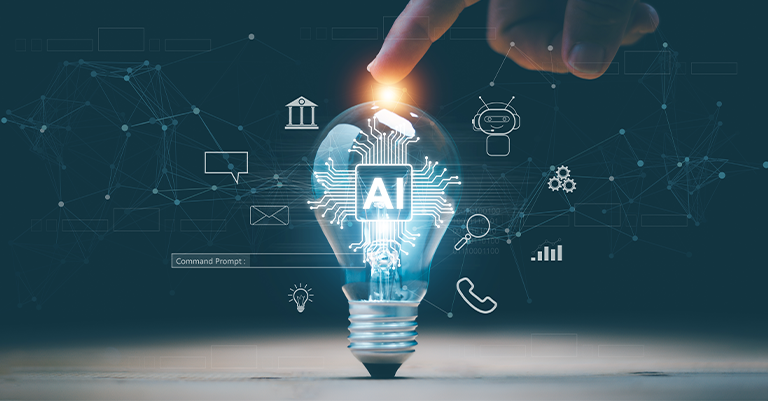Unlocking Efficiency: The Power of AI Business Automation
In today’s fast-changing business world, keeping up is very important. This is where AI business automation comes in. It’s an intelligent technology that helps companies work better and faster. How? It takes care of tedious, repetitive tasks, like sorting emails or keeping track of schedules. This way, people can spend more time thinking of new ideas and solving big problems.
AI Business Automation: More Than Just Algorithms

AI business automation uses artificial intelligence to complete business tasks automatically. It’s like having a super-smart assistant that can handle things like answering customer questions or sorting through difficult data. AI isn’t just fast—it’s also clever. It helps businesses get their work done better and with fewer mistakes.
Efficiency Unleashed
AI takes care of boring tasks, reducing mistakes and making work faster. It handles data and automates chats, freeing up time for creative thinking and problem-solving. AI chatbots answer customer questions, while automated systems track inventory right away. These tools make things quicker and more reliable, so businesses can keep their quality high without constantly checking. The result is a more efficient workplace that uses time and money wisely.
Cost-Effective Solutions
Automating tasks helps companies save money on labor and use their resources better. AI means fewer people are needed for data entry and routine tasks. This saves money on salaries and training, allowing employees to focus on important areas like planning and customer service. For example, AI chatbots provide support 24/7, costing less than hiring extra staff while being more efficient.
Accuracy and Precision
AI can look at large amounts of data quickly, reducing errors and helping companies make smarter choices. In industries like finance, healthcare, and logistics, even small mistakes can be costly. AI spots patterns and trends that people might miss, leading to more accurate decisions. For example, AI can predict stock market trends or detect equipment issues in factories before they become big problems. This helps businesses stay ahead and keep things running smoothly.
The Big Picture: Why AI Business Automation is a Game-Changer

You might be wondering, “Why does AI business automation matter?” Let’s look at the benefits:
Scalability at Its Best
Need to grow your operations? AI makes it easy, adjusting smoothly to increased demand. As businesses expand, AI manages larger data loads and customer interactions without extra costs. From automating customer support with chatbots to using predictive analytics in supply chains, AI ensures smooth scaling. This helps companies meet higher demand without losing quality or performance, making growth less stressful and more affordable.
Enhanced Customer Experience
AI creates personalized interactions and quick solutions, leading to happier customers. It customizes experiences based on customer behavior, using recommendation tools and chatbots to give accurate support. This personal touch makes customers feel valued, boosting loyalty. AI works 24/7, providing instant help and reducing wait times. The result is a smooth, satisfying customer experience that keeps them coming back, helping businesses build long-lasting relationships.
Data-Driven Insights
AI doesn’t just automate—it learns and offers valuable insights for better decisions. By studying large datasets, AI finds trends and patterns that people might miss. These insights improve decisions in areas like product development and marketing. For example, AI can analyze feedback to spot trends or use sales data to predict demand. This keeps businesses flexible and competitive, turning data into strategies for continued growth.
Real-World Applications: AI in Action
Let’s see how AI business automation is changing different industries:

Customer Service: The Chatbot Revolution
AI is reshaping customer service, offering fast and effective support to meet growing customer needs.
24/7 Availability
AI chatbots never rest. They provide instant help anytime, ensuring customers get answers day or night. Unlike human agents, chatbots work around the clock, handling customer questions even outside regular business hours. This keeps customers happy and builds loyalty.
Automation of Routine Queries
From tracking orders to answering FAQs, chatbots manage it all, leaving human agents to solve complex issues. By managing simple tasks, AI chatbots let customer service teams focus on more challenging problems that need a human touch. This speeds up response times and improves service quality.
Sales and Marketing: Precision Targeting
AI is changing sales and marketing, helping businesses reach the right customers with personalized strategies.
Predictive Analytics
AI studies customer behavior to predict buying habits, creating targeted marketing campaigns. Understanding customer preferences helps businesses make ads that connect with their audience, boosting sales and maximizing marketing results.
Automated Lead Scoring
Sales teams can now focus on the best leads, thanks to AI’s precise scoring. AI evaluates potential customers based on their behavior and chance of buying, helping sales teams use their time wisely. This results in better leads and improved sales.
Human Resources: Streamlining Recruitment

AI makes hiring easier and faster, helping HR teams find the right talent
AI Screening Tools
No more overflowing resumes. AI screens candidates quickly, letting the best ones through. It scans resumes for key skills and experience, so HR can focus on interviewing the top candidates.
Seamless Onboarding
Automated systems ensure new hires start off right, making their transition smooth. AI guides new employees through their onboarding, from filling out forms to accessing training materials, ensuring a well-organized beginning.
Finance and Accounting: Accuracy Redefined
AI improves accuracy and speed in financial tasks, helping companies manage money better.
Invoice Processing
AI-powered tools handle billing accurately, cutting down errors and saving time. By automating invoice tasks, businesses can speed up payments and reduce mistakes, which improves cash flow.
Fraud Detection
AI scans transactions to find unusual patterns, protecting against fraud. Advanced algorithms monitor activities in real-time, catching signs of trouble before they become bigger issues. This helps businesses avoid losses and keep customer trust.
Supply Chain Management: Optimizing Operations
AI improves supply chain processes, helping companies meet demand while saving money.
Inventory Management
AI predicts demand and manages inventory, cutting waste and ensuring timely restocks. By analyzing trends, AI helps businesses keep just the right amount of stock, avoiding overstock or shortages and saving costs.
Logistics Optimization
AI makes delivery routes more efficient, reducing delays. By studying factors like traffic and weather, AI finds the best routes and manages shipments, speeding up delivery times and cutting costs. This keeps operations running smoothly and customers satisfied.
Implementing AI Business Automation: A Step-by-Step Guide

Implementing AI business automation can change how businesses work, making tasks faster, more accurate, and cost-effective. To ensure success, follow a structured plan. This guide covers each step, helping you make the most of AI while reducing risks and maximizing gains. From finding areas for automation to ensuring smooth integration and ongoing improvements, these steps will guide you toward an AI-driven future.
Identify Opportunities
The first step is to find where AI can add the most value. Focus on areas with repetitive and time-consuming tasks to see quick benefits.
Look for Repetitive Tasks Ripe for Automation
Find tasks that are ideal for automation, like data entry, customer inquiries, or routine analysis. Start with small projects to reduce the risk of disruption and help teams understand AI’s impact before expanding to more complex areas.
Choose Wisely
Choosing the right AI tools is crucial. Your selection will impact the efficiency and success of your automation plan.
Research AI Tools That Align with Your Goals
Research tools that match your goals. For example, retail businesses might need AI for customer service, while logistics companies may want predictive analytics. Read reviews, compare options, and try tools before making a choice.
Seamless Integration
To truly benefit from AI, it must work well with your current systems. Smooth integration ensures minimal disruption to daily work.
Ensure AI Solutions Integrate Smoothly with Existing Systems
Check your current IT setup and see how new AI tools will fit in. Work with IT teams on data migration, software compatibility, and training. This ensures your AI systems work smoothly with your existing tools, avoiding data problems and technical issues.
Empower Your Team
Successful AI implementation depends on how well your team adjusts to changes. Training them to work with AI tools ensures they can use the new technology effectively.
Educate Employees on Working Alongside AI Tools
A trained team can get the most from AI. Show how AI can make tasks easier, not replace jobs. Offer workshops, online classes, and practice sessions. Encourage open communication to address concerns and help everyone adapt to the changes.
Continuous Improvement
Implementing AI is not a one-time job. To keep up with new tech and business needs, continuous improvement is key.
Monitor AI Systems and Optimize Them Regularly
Track key performance indicators (KPIs) to see how well AI is working. Make updates and changes as needed. Get feedback from employees who use the tools, as their insights can help improve the system. By keeping a close eye on performance, businesses can ensure their AI tools stay effective and meet their needs over time.
Debunking Myths: Common Misconceptions

AI business automation often faces doubts. Let’s clear up some common myths:
“AI Will Take Our Jobs”
Many fear that AI will replace jobs, but it’s more complicated than that. While AI automates repetitive tasks, it also creates new roles in areas like AI management, data analysis, and strategic planning. By managing tedious work, AI lets employees focus on creative and complex tasks. Instead of eliminating jobs, AI changes them, helping workers develop new skills for a tech-driven world.
“It’s Too Expensive”
Some businesses think AI costs too much, but the long-term savings can be huge. The initial investment in software, hardware, and training is balanced by lower labor costs and higher efficiency. For example, AI chatbots can save on customer service expenses. AI tools can also make supply chains more efficient, cutting costs and reducing waste. Automating time-consuming tasks boosts productivity, leading to a strong return on investment over time.
“Only for Big Players”
AI isn’t just for big companies; small and medium-sized businesses can use it too. Scalable AI tools let businesses of any size start small and grow gradually. Cloud-based AI platforms, for example, offer subscription models, allowing smaller businesses to pay only for what they use. These tools can automate tasks like social media management and customer data analysis. By focusing on specific needs, smaller businesses can use AI to achieve big results.
Industries Benefiting from AI Business Automation
AI business automation isn’t just for tech giants. Here’s how different industries are gaining from it:
Healthcare
AI is changing healthcare by boosting speed, accuracy, and patient care. It helps manage patient data, aids in diagnostics, and analyzes medical records for better decision-making. AI-powered imaging tools can detect diseases early, like spotting cancer in scans. It also automates administrative tasks like scheduling and insurance claims, allowing healthcare providers to spend more time with patients. This integration improves efficiency and raises the quality of care.
Retail
AI is reshaping retail by adapting to customer needs and market trends. It personalizes shopping experiences, predicts demand to manage inventory, and enhances customer service. By analyzing customer data, AI can suggest products tailored to each shopper, increasing sales and loyalty. AI chatbots manage routine customer questions, providing quick help and freeing up human agents for more complicated issues. This mix of personalized marketing and smoother operations helps retailers stay competitive.
Manufacturing
AI improves manufacturing by optimizing production, cutting costs, and reducing waste. It predicts when equipment needs maintenance, preventing breakdowns and extending the life of machinery. AI analyzes production data to find inefficiencies and suggest improvements, leading to higher-quality output with less waste. It also automates quality control, ensuring consistent standards and faster production. These improvements help manufacturers increase productivity while keeping costs in check.
Security and Adaptability: Addressing Concerns

Security and adaptability are key when using AI systems:
Robust Security Measures
Security is vital when using AI, especially for businesses with sensitive data. AI tools use advanced encryption and follow industry standards to keep data safe during storage and transmission. They can spot unusual patterns, offering real-time alerts about possible threats. By integrating AI with existing security systems, businesses can boost cybersecurity, protect customer and financial data, build client trust, and prevent cyberattacks.
Scalability and Customization
AI’s ability to scale makes it perfect for growing businesses. AI solutions can adapt as companies expand or face new market conditions, managing larger tasks without losing speed. AI-powered customer service can manage more inquiries, while analytics tools can process bigger data sets. Plus, AI systems can be customized to meet specific industry needs, offering tailored solutions that match business goals. This ensures businesses get the most out of their AI investment as their needs change.
The Road Ahead: AI Business Automation’s Future
As technology advances, AI business automation will keep evolving, creating new opportunities:
Increased Collaboration
The future of AI business automation is about humans and machines working together. AI will take care of repetitive tasks, allowing employees to focus on creative and strategic work. It can analyze data and provide insights, supporting better decision-making and driving innovative solutions. This teamwork between human creativity and AI’s efficiency makes businesses more productive and flexible, creating a workplace where both can excel.
Ethical AI Practices
As AI becomes more essential, ethical development is key to building trust. Focusing on fairness, transparency, and privacy ensures that AI respects user rights and stays unbiased. This is especially crucial in fields like hiring and finance, where AI’s impact can be big. By prioritizing responsible AI practices, businesses can boost their reputation, reduce risks, and ensure their AI systems align with social values.
Wider Adoption
AI is becoming more accessible, enabling businesses of all sizes to benefit from it. Cloud-based AI platforms and easy-to-use tools allow smaller companies to adopt AI without huge investments. This means AI is no longer just for large corporations—smaller businesses can automate customer service, analyze data, and improve their operations. As more companies adopt AI, it will become a standard tool, driving innovation and leveling the playing field across industries.
Conclusion: Embrace the AI Revolution

Today, using AI in business is not optional—it’s a must for staying competitive. AI improves how businesses work by simplifying processes, reducing manual work, and managing repetitive tasks. This makes companies more efficient, so they run better.
AI also helps make decisions faster and more accurately. It analyzes lots of data, finds trends, and gives useful insights. This helps businesses adapt quickly to changes and make smart choices for growth.
AI opens new doors, giving customers personalized experiences and improving supply chains. These improvements help businesses meet customer needs and stay ahead of competitors. By taking over routine tasks, AI saves time and resources. This allows companies to focus on creating new ideas and solving problems that need a human touch.
As businesses use AI, they can focus on bigger goals and achieve even more success over time. The future belongs to those who can change with new technology. AI is now easier to use, with solutions for businesses of all sizes. This means even small companies can benefit, making it fairer for everyone and creating new chances for success.
Are you ready to use AI, simplify your work, and lead your business into a future of growth and efficiency? Now is the time to embrace AI and explore the endless possibilities it offers. Take the chance to guide your business into a new era of innovation.





